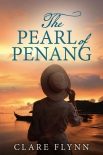The Pearl of Penang by Clare Flynn (best books to read for students txt) 📗

- Author: Clare Flynn
Book online «The Pearl of Penang by Clare Flynn (best books to read for students txt) 📗». Author Clare Flynn
30
Australia felt like exile to Evie. She was relieved to have brought the children to safety but was desperate for news of her friends. She devoured the newspapers and discovered that Europeans from the entire Malay peninsula had crowded into the small island of Singapore. Officers as well as the rank and file of the retreating British army, engineers, planters, tin miners, civil servants, and their wives and children, all racing for safety to the impregnable fortress that Singapore was claimed to be.
The men were drafted into service to lay barbed wire on the northern shore, which had been left undefended in the misguided assumption that the only conceivable attack by the Japanese would come by sea from the south.
But on the 15th February, the island that had been the strategic pivot of the British Empire in the east, the gateway and presumed defence to the dominion of Australia, was toppled in what would later be described by the Australia Prime Minister as ‘an inexcusable betrayal’ by the British. The Japanese had achieved the unthinkable and Singapore and the Malayan peninsula now flew the imperial flag.
Of Mary Helston, Evie heard nothing. There was nowhere to make enquiries regarding the whereabouts of unrelated individuals and the assumption was that, unless she and her parents had escaped before the fall of the city, Mary would now be in a civilian internment camp.
The women were placed in cramped accommodation via the Red Cross – Perth and the surrounding areas were awash with refugees, not only from Malaya but also from Darwin and Hong Kong. After delays during which they were granted government loans of around three pounds a week, both women were able to access their own funds via the Australian banks. They managed to rent a bungalow together, pooling the childcare and supplementing their income by taking in paying guests.
After several months in Australia, Susan was notified by the Malayan Agent for Tokyo Cables that Reggie was interned in the civilian camp in Changi, Singapore. This came first as a relief, then a source of anxiety to Susan.
Time dragged for Evie. It was not that she disliked Western Australia – the climate was pleasant after the mugginess of Penang and the beaches a welcome playground for the children – but she felt displaced, rootless. Neither she nor Susan wanted to risk the long sea voyage to Britain, knowing the perils of U-boats and airborne attacks. After their experiences in Penang they were grateful to be away from the main theatres of war.
Three months after the nuclear bomb attacks on Hiroshima and Nagasaki, and the subsequent Japanese surrender, Evie returned to Malaya. Susan had left for England as soon as Victory was declared in Europe in May 1945.
Meeting Mary Helston again shocked Evie to the core. Approaching the bungalow in George Town where the teacher had lived with her parents, Evie was anxious and unsure whether she would find anyone there. The closed shutters and neglected garden reinforced these doubts. The figure who opened the door caused her to gasp.
Mary Helston was emaciated. Her arms and her legs were scarred and discoloured and her skin hung from her bones with barely any flesh. Dark rings circled her hollowed eyes and her cotton dress billowed about her, many sizes too large for her stick-like frame. Mary’s previously thick lush hair was thin as a baby’s, cropped short and choppy.
‘Evie.’ The voice was flat. She gave a hollow laugh. ‘I know. I look hideous. Would you believe I’ve already put on almost a stone. You should have seen me the day we were liberated. Come in.’
She led Evie into the drawing room at the back of the modest house. It was cool in there, the shutters and French doors shut against the light. Evie couldn’t help remembering how they used to be always open so that the garden seemed part of the house.
‘Every day I get a little better. They say it will take time. It took more than three years to get into this state so I can’t expect to get well in just a few months.’
‘Your parents?’
‘Dead.’
‘Oh Mary, I’m so sorry.’ Evie felt tears welling up inside her.
‘We left it too late to get away from Singapore. Mum and I volunteered at the hospital. We didn’t want to leave without Dad. He was determined to do his bit. And we never thought Singapore would fall. When we finally got on a ship, the Japs intercepted us in the Straits of Malacca and we were arrested. They took Dad to Changi from where he was sent on to a forced labour camp and died there. Mum and I were kept together but she died just six months before liberation. Dad had been due to retire this year. He was fit and healthy and could have had a long life, but they killed him with hard labour, starvation and disease. Mum was only fifty-eight.’
Evie didn’t know what to say. How could any words of comfort be adequate in the circumstances? In the end she asked, ‘Frank?’
‘Yes. I found out while we were in Singapore. They told me he was killed in that first air attack on Butterworth and the island. He was shot down in flames over the Straits. Wouldn’t have stood a chance.’
They lapsed into silence. Mary looked up at Evie. Her eyes were so empty it was disconcerting, as though she wasn’t really seeing. ‘Enough about me. How was Australia? You got there safely?’
Evie nodded, feeling guilty. ‘To Perth. It was fine. Susan Hyde-Underwood was there too, and





Comments (0)